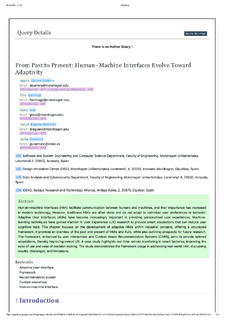| dc.contributor.author | Carrera-Rivera, Angela | |
| dc.contributor.author | Larrinaga, Felix | |
| dc.contributor.author | Lasa, Ganix | |
| dc.contributor.author | Reguera-Bakhache, Daniel | |
| dc.contributor.other | Unamuno, Gorka | |
| dc.date.accessioned | 2024-11-22T09:03:45Z | |
| dc.date.available | 2024-11-22T09:03:45Z | |
| dc.date.issued | 2024 | |
| dc.identifier.isbn | 978-3-031-71697-3 | en |
| dc.identifier.other | https://katalogoa.mondragon.edu/janium-bin/janium_login_opac.pl?find&ficha_no=178400 | en |
| dc.identifier.uri | https://hdl.handle.net/20.500.11984/6816 | |
| dc.description.abstract | Human–machine interfaces (HMI) facilitate communication between humans and machines, and their importance has increased in modern technology. However, traditional HMIs are often static and do not adapt to individual user preferences or behavior. Adaptive User Interfaces (AUIs) have become increasingly important in providing personalized user experiences. Machine-learning techniques have gained traction in User Experience (UX) research to provide smart adaptations that can reduce user cognitive load. This chapter focuses on the development of adaptive HMIs within industrial contexts, offering a structured framework. It provides an overview of the past and present of HMIs and AUIs, while also outlining prospects for future research. The framework, enhanced by user interactions and Context-Aware Recommendation Systems (CARS), aims to provide tailored adaptations, thereby improving overall UX. A case study highlights real-time remote monitoring in smart factories, improving the ease of use and ease of decision making. The study demonstrates the framework usage in addressing real-world HMI, discussing results, challenges, and limitations. | en |
| dc.language.iso | eng | en |
| dc.publisher | Springer Nature | en |
| dc.rights | © 2025 The Author(s) | en |
| dc.subject | ODS 8 Trabajo decente y crecimiento económico | es |
| dc.subject | ODS 9 Industria, innovación e infraestructura | es |
| dc.title | From Past to Present: Human-Machine Interfaces Evolve Toward Adaptivity | en |
| dc.type | http://purl.org/coar/resource_type/c_3248 | |
| dcterms.accessRights | http://purl.org/coar/access_right/c_f1cf | en |
| dcterms.source | Future Perspectives on Human-Computer Interaction Research: Towards the Year 2030 | en |
| local.contributor.group | Centro de Innovación en Diseño | es |
| local.contributor.group | Análisis de datos y ciberseguridad | es |
| local.contributor.group | Ingeniería del software y sistemas | es |
| local.description.peerreviewed | true | en |
| local.description.publicationfirstpage | 151 | en |
| local.description.publicationlastpage | 186 | en |
| local.identifier.doi | https://doi.org/10.1007/978-3-031-71697-3_7 | en |
| local.embargo.enddate | 2025-10-31 | |
| local.contributor.otherinstitution | https://ror.org/003qafx79 | es |
| oaire.format.mimetype | application/pdf | en |
| oaire.file | $DSPACE\assetstore | en |
| oaire.resourceType | http://purl.org/coar/resource_type/c_3248 | en |
| oaire.version | http://purl.org/coar/version/c_ab4af688f83e57aa | en |
| oaire.funderName | Comisión Europea | en |
| oaire.funderName | Gobierno Vasco | en |
| oaire.funderName | Gobierno Vasco | en |
| oaire.funderIdentifier | https://ror.org/00k4n6c32 / http://data.crossref.org/fundingdata/funder/10.13039/501100000780 | en |
| oaire.funderIdentifier | https://ror.org/00pz2fp31 / http://data.crossref.org/fundingdata/funder/10.13039/501100003086 | en |
| oaire.funderIdentifier | https://ror.org/00pz2fp31 / http://data.crossref.org/fundingdata/funder/10.13039/501100003086 | en |
| oaire.fundingStream | H2020-MSCA-ITN-2018 | en |
| oaire.fundingStream | Ikertalde Convocatoria 2022-2025 | en |
| oaire.fundingStream | Ikertalde Convocatoria 2022-2023 | en |
| oaire.awardNumber | 814078 | en |
| oaire.awardNumber | IT1676-22 | en |
| oaire.awardNumber | IT1519-22 | en |
| oaire.awardTitle | Digital Manufacturing and Design Training Network (DIMAND) | en |
| oaire.awardTitle | Grupo de sistemas inteligentes para sistemas industriales. IKERTALDE 2022-2025 | en |
| oaire.awardTitle | Ingeniería de Software y Sistemas. IKERTALDE 2022-2023 | en |
| oaire.awardURI | https://doi.org/10.3030/814078 | en |
| oaire.awardURI | Sin información | en |
| oaire.awardURI | Sin información | en |







